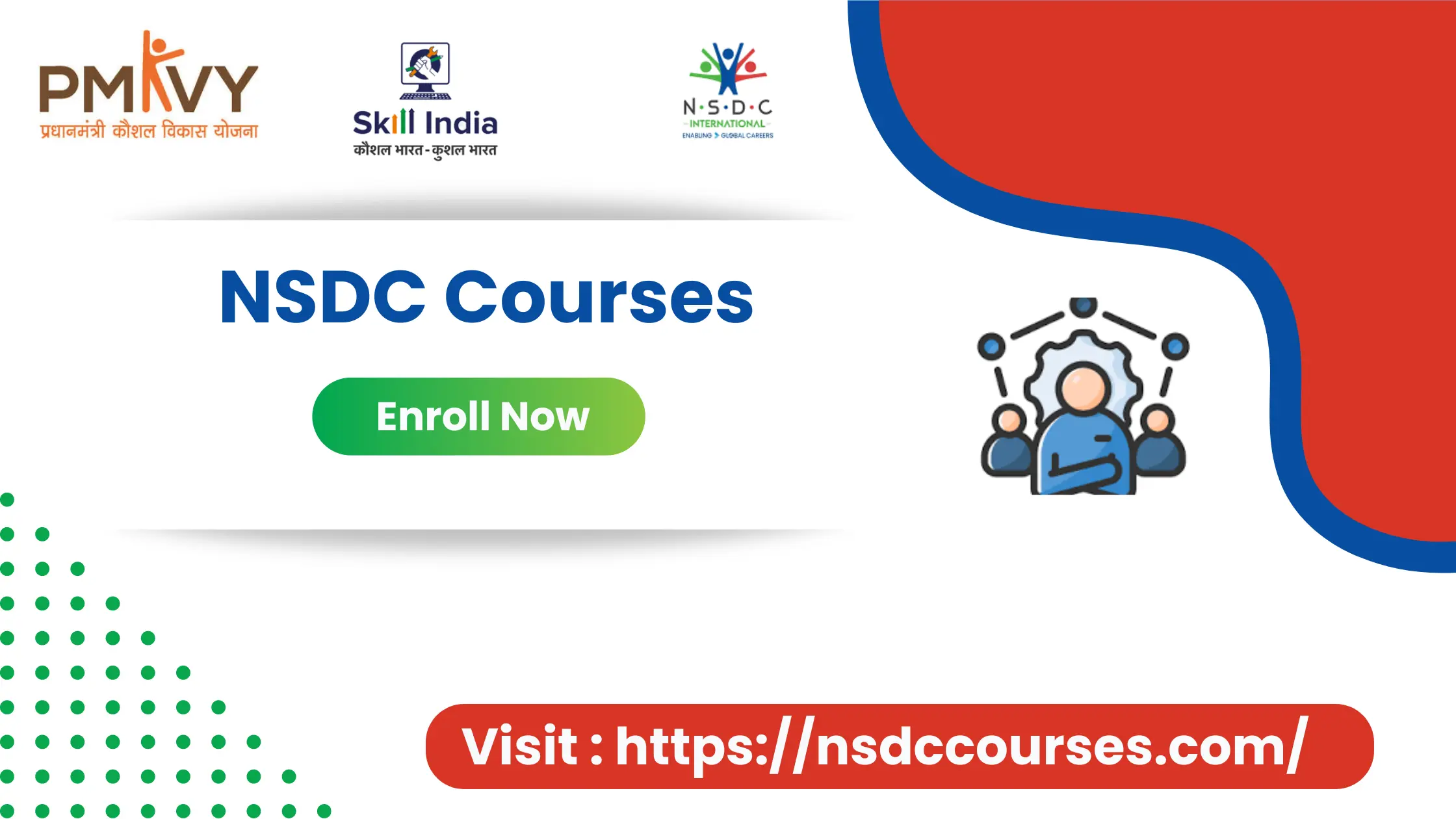NSDC Courses | National Skill Development Corporation India

National Skill Development Corporation (NSDC)
The National Skill Development Corporation (NSDC) was primarily responsible for designing the country’s skill ecosystem. NSDC was founded to encourage private sector involvement in vocational training. It is a unique Public-Private Partnership (PPP) organization that operates under the Ministry of Skill Development & Entrepreneurship (MSDE), Government of India. Its main goal is to provide successful vocational training programs and NSDC courses to empower India’s young by acting as the mission’s strategic implementation and knowledge partner for the Skill India Mission. The NSDC provides support to businesses, startups, and organizations that offer future-ready skills to prospective employees. By offering money to qualified organizations, candidate concessional loans, and other cutting-edge financial solutions, the organization creates efficient models to assist, coordinate, and improve private sector skilling activities. It also forges strategic relationships in this regard.
NSDC Course Details
The details about the NSDC skill development courses and its training partners are discussed below;
| Particulars | Details |
| Training Partners | 538 |
| Training Centers | 10,373 |
| Job Roles | 1500+ |
| Sector Skills Council | 36 |
| Trained | 20.45 Lakhs |
| Placed | 1.86 Lakhs |
The NSDC undertakes several different programs. These programs will offer different vocational, certificate, and training courses. Below are some of these NSDC-certified courses:
# NSDC Courses and Programs: A Complete Guide
The National Skill Development Corporation (NSDC) is a vital initiative under the Skill India Mission, aimed at empowering individuals with industry-relevant skills. From vocational training to professional certifications, NSDC provides numerous opportunities for career growth. In this article, we will explore various NSDC courses, certifications, and programs that can help you build a successful career.
1. PM Vishwakarma Yojana
PM Vishwakarma Yojana is a government initiative designed to support artisans and craftsmen by providing them with financial assistance and skill development training.
2. Healthcare Sector Skill Council
The Healthcare Sector Skill Council focuses on training individuals in healthcare-related professions, ensuring better employment prospects in the medical field.
3. Takshashila Portal
The Takshashila Portal serves as a national platform for trainers and assessors, providing them with resources and opportunities for skill enhancement.
4. Hunarbaaz Timing
Hunarbaaz is a skill-based competition that showcases the talents of skilled professionals, promoting vocational training and entrepreneurship.
5. Assistant Electrician Course
The Assistant Electrician program trains individuals in electrical installation, maintenance, and safety measures, ensuring they meet industry standards. More details can be found here.
6. National Apprenticeship Development Corporation (NADC)
NADC offers apprenticeship programs to enhance practical knowledge and on-the-job training for various industries.
7. DRA Full Form in Banking
The Debt Recovery Agent (DRA) program is essential for professionals in banking and finance, providing them with the necessary skills for handling debt recovery processes.
8. Health Sector Skill Council
This council ensures quality training and certification for healthcare professionals. Visit here to learn more.
9. Customer Care Executive Training
A specialized program for aspiring customer support representatives. Training details can be accessed here.
10. SDMS Login
SDMS (Skill Development Management System) is an online platform for managing training programs and student registrations under NSDC.
11. Skill India Certificate Download
Candidates who complete NSDC-certified courses can download their Skill India Certificates from here.
12. NSDC India Portal
The official NSDC portal provides access to various courses, job opportunities, and training centers across India.
13. Skill India Registration
To enroll in Skill India programs, candidates can register on the Skill India Portal here.
14. ITI Institutes under NSDC
Find NSDC-affiliated Industrial Training Institutes (ITI) through this link: ITI Training Centers.
15. National Skill Development Corporation Courses List
A complete list of NSDC-certified courses is available at this link.
16. E-Skill India Free Courses Certificate
E-Skill India provides free online courses with certification to enhance employability.
17. NSDC Apprenticeship Program
The NSDC Apprenticeship Program offers on-the-job training for students and professionals. Check details here.
18. PMKVY Courses List
Pradhan Mantri Kaushal Vikas Yojana (PMKVY) provides free skill training for unemployed youth to improve their job prospects.
19. Field Technician Computing and Peripherals
This hardware and networking course trains candidates in computer maintenance and troubleshooting. Learn more here.
20. How to Apply for a Job in NSDC
Interested in working with NSDC? Check the latest job openings at this link.
NSDC Free Courses 2025
The National Skill Development Corporation (NSDC) is a charitable organization that was founded to supply India’s labor market with qualified and experienced workers. It was launched in 2008 by the Ministry of Finance and operates under the Companies Act of 1956 with a focus on public-private partnerships. This organization’s primary goal is to create more jobs in the nation by training over 40 crore individuals in a variety of areas.
NSDC Courses List Under Skill Development Sectors
The skill sectors provide various NSDC online courses and certificates that NSDC deals with;
List of NSDC Courses under PMKVY
NSDC Online Courses
NSDC also offers many online courses under e-skills. The popular NSDC online courses are below;
Mission of NSDC
Core Values of NSDC
NSDC – Skill Development, Certification, Jobs, and Opportunities Across India
The National Skill Development Corporation (NSDC) plays a crucial role in empowering the Indian youth through skill training, job opportunities, and certifications. Whether you’re looking for NSDC jobs, exploring an NSDC internship, or trying to understand the NSDC certificate value, this platform offers a wide range of opportunities. With various NSDC training centres across India, including in Lucknow, Delhi, Guwahati, Odisha, and West Bengal, individuals can access quality skill development programs.
Registration for training can be done via NSDC registration online, where applicants can also download the NSDC registration form and check the NSDC job vacancy updates. Certified candidates can easily verify or download their NSDC certificate in PDF, and check its authenticity through the NSDC certificate verification or NSDC certificate verify process. For aspiring trainers and partners, options such as NSDC trainer registration, NSDC training partner registration, and the NSDC training partner list are available.
Navigational support such as the NSDC contact number, toll-free number, and NSDC address ensures ease of access, while events like the Kaushal Mahotsav promote awareness and engagement. Users also explore terms like NSDC application, NSDC logo, NSDC logo PNG, and services like NSDC assessor login, NSDC tenders, and NSDC eProc. Queries such as how to get an NSDC certificate, NSDC jobs salary, and how to apply for a job in NSDC are common among seekers.
Additionally, PMKVY NSDC helpline number, NSDC course fees, and information about NSDC partners and the NSDC chairman are frequently searched. NSDC continues to evolve with digital tools like the SMART NSDC platform, aiming to strengthen India’s workforce through structured skill development.
Regulatory Body-NCVET
The National Council of Vocational Education and Training (NCVET) was established on 5 December 2018 and is a comprehensive regulatory body. They aim to ensure quality in the Technical and Vocational Education and Training (TVET) sector. In the past, it has served as both the National Council of Vocational Training (NCVT) and the National Skill Development Agency (NSDA).
NCVET aims to promote strong industry linkages and implement effective regulations for diverse stakeholders to enhance outcomes. It establishes standards for awarding bodies and assessment agencies, addressing issues arising from multiple regulators and conflicting principles that lead to challenges of quality and outcomes in training. NCVET aims to unify the fragmented regulatory system and embed quality assurance across the entire vocational training value chain.
The main functions performed by NCVET include:
